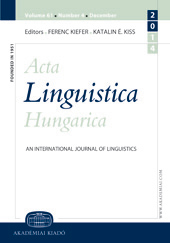Bilingual semantic representation and lexical access
Bilingual semantic representation and lexical access
Author(s): Judit NavracsicsSubject(s): Semantics, Psycholinguistics, Cultural Anthropology / Ethnology, Culture and social structure , Social Theory, Sociology of Culture
Published by: Akadémiai Kiadó
Keywords: psycholinguistics; Sapir-Whorf hypothesis; code-switching; bilingualism; lexical access;
Summary/Abstract: This study presents evidence concerning semantic representation in bilingual memory. A vast majority of the early research on this topic proposed that fluent bilinguals access semantic representations that are shared across their two languages. More recent research proves that the question is not as simple as that. Bilinguals can sometimes use shared semantic representations across their two languages, but the conditions under which they can do so are constrained by the nature of the material, by the form of the task, by the level of proficiency in the second language, and by the lexical-level connections between the two languages. The present study provides an analysis of some psycholinguistic tests carried out among bilingual and bicultural people within a new framework proposing that there are asymmetries in the strength of the connections between lexical representations in different languages and between lexical representations and concepts. The author examines bilingual and bicultural semantic representations and their linguistic realisations, and the switching attitudes of bilinguals through the analysis of three tests conducted among bilingual and bicultural subjects.
Journal: Acta Linguistica Hungarica (Since 2017 Acta Linguistica Academica)
- Issue Year: 49/2002
- Issue No: 2
- Page Range: 225-247
- Page Count: 23
- Language: English

